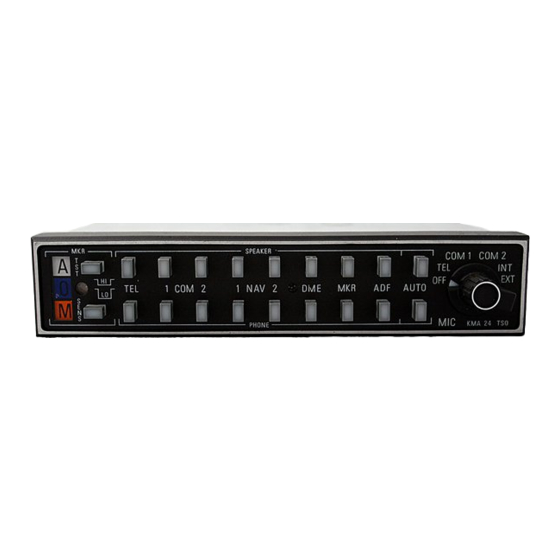Bendix/King Skymap IIIC Podręcznik - Strona 2
Przeglądaj online lub pobierz pdf Podręcznik dla Transceiver Bendix/King Skymap IIIC. Bendix/King Skymap IIIC 6 stron. Global positioning system
Również dla Bendix/King Skymap IIIC: Podręcznik pilota (14 strony), Skrócona instrukcja obsługi (6 strony)

Compact TSO'd consoles
make audio control
"push button simple"
Push button simplicity puts complete,
flexible audio control right at your fingertips
with Bendix/King's easy-to-use KMA 24
and KMA 24H systems.
Each is self-contained, all solid-state
and stands only 1.3 inches high in your Silver
Crown stack. The "slant top" package tailors
it for the top slot in your instrument panel.
The KMA 24 controls as many as three
transceivers and six receivers, including
the internal marker beacon receiver and its
automatically dimmed 3-light presentation.
The KMA 24H controls up to five transceivers
and five receivers, or four transceivers
and six receivers.
The KMA 24H replaces the internal marker
beacon receiver with an intercom, which provides
unprecedented flexibility. The intercom features
capability for hot mike, voice activation (VOX),
or keyed activation of up to five intercom stations.
In hot mike operation all intercom microphones
remain active at all times whether the operator
is talking on intercom or not. Voice activated
operation has the microphone active only when
the operator begins to talk. In keyed operation,
the operator may depress a separate intercom
switch to activate the microphone for
intercom usage.
When two KMA 24H's are installed, dual
transmit flexibility is provided–allowing the pilot
and copilot or another crew member to talk
on different transmitters simultaneously while
providing pilot priority if the same transmitter
is keyed by both crew members at the same time.
The KMA 24H also includes voice recorder
compatibility and an emergency mode, which
connects the pilot's headphones and microphone
directly to COMM 1 in the event of a KMA 24H
failure or a power interruption to the KMA 24H.
The KMA 24 and KMA 24H provide
transceiver and receiver outputs to speaker
or headphones or both. A separate isolation
amplifier for headphones maintains constant,
noise-free volume levels, even when several
receivers are monitored at once. Keying
a mike mutes all receivers automatically
to eliminate feedback.
The KMA 24 is offered in four configurations
and the KMA 24H in two configurations,
so you can choose the one that best matches
your requirements.
You'll find more detailed information,
specifications, and a convenient tear-off
Pilot's Guide for both units on the following pages.
Audio Control With
The KMA 24
Two rows of alternate-action push buttons
on the KMA 24 console control all receiver audio
distribution functions.
The top row of push buttons selects receivers
for the cockpit speaker, the bottom row for head-
phones. Both rows are completely independent
of each other, allowing selection of speaker
or headphones, or both, for all combinations
of receivers.
The rotary selector switch on the right side
of the console connects the microphone to either
COMM 1 or COMM 2. An additional switch
position allows selection of radiotelephone on
some KMA 24 models, or of HF on other models
of the KMA 24. Other switch positions are for
cabin address and ramp hailer.
Turning the microphone selector switch
to OFF cuts power to the speaker amplifier
and the marker beacon receiver. The headphone
amplifier remains in operation.
The AUTO feature, when engaged,
automatically matches the corresponding receiver
audio with the selected transmitter, such as
COMM 1, COMM 2, TEL or HF transmitter.
An option allows the AUTO feature to be replaced
by a second ADF receiver position.
The unit operates on either 13.75 volts
or 27.5 volts without the use of adapters
or converters.
Built-In Marker Beacon
The KMA 24 has a built-in, crystal
controlled, superheterodyne marker beacon
receiver with a three-light display. Its excellent
selectivity eliminates interference from FM radio
and TV stations. Dimming circuitry automatically
adjusts the brightness of the lamps to a level
appropriate for ambient cockpit light.
The lower push button next to the marker
lamps selects high and low sensitivity; the upper
push button tests the lights.
The unit can also drive remote marker beacon
lights, such as those in Bendix/King Autopilot
Annunciator Panels or the KA 40 Remote Marker
Light display.
Five-Station Voice
Activated Intercom
In the KMA 24H, a five-station intercom
replaces the KMA 24's integral marker beacon
receiver and lights. The intercom includes three
modes of operation: hot mike, voice activated
(VOX) or keyed activation for up to five
intercom stations.
In single KMA 24H installations, the pilot's
microphone has priority over the crew member's
microphone in the vent both are trying to transmit
at the same time.
In a dual KMA 24H installation the pilot
and a crew member can talk on different
transmitters at the same time; however, the pilot
will automatically have priority if he keys
the mike while another crew member is using
the same transmitter.
An emergency position (EMG) on the
microphone selection switch connects the pilot's
mike and headphones directly to COMM 1
as a means of fail-safe communication in the
event of a failure within the KMA 24H.
Since the KMA 24H has an integral intercom,
a "PA" position replaces the "INT" position on
the microphone selection switch. In aircraft
equipped with a cabin speaker, this position allows
the pilot or copilot to make announcements
to the passengers.
KR 21 Marker Beacon Receiver
The cockpit can easily have marker beacon
reception and display as well as the convenience
of the KMA 24H's built-in five-station intercom.
The TSO'd Bendix/King KR 21 Marker Receiver
provides marker beacon audio signals to the
KMA 24H and has a marker light display similar
to that in the KMA 24.
The KR 21 is self-contained and can
be mounted anywhere in the panel, either
horizontally or vertically. It is all solid-state
and has its own self-test and automatic dimming.
